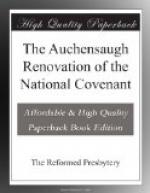2d, Such as would rightly renew covenant with God, must be well resolved concerning the motives leading them to covenant; which motives must neither arise wholly from without, nor yet wholly from within, for if these motives arise wholly from without, it discovers a great deal of treachery in the persons covenanting, as not beginning at the heart, not duly considering the inward case of the soul, but being moved from some external considerations, as a name amongst men, or affectation of zeal for public concerns, or such like; if they arise wholly from within it betrays much weakness and lowness of spirit, as not being able at the same time both to have a concern about the inward frame of the heart, and eternal state and condition of the soul, and likewise a zeal for the public good of the nation, and thriving of the work of God and kingdom of Christ. Both which interests ought to be in their due proportion before the eyes of a sound and real Covenanter; a right engager in covenant must be moved thereto, both from a due sense of the strength and power of corruption within, and also from the consideration of the lowness of God’s work through defection without.
3d, A right covenanter must be well resolved concerning the terms of the covenant; that it excludes all coming and going, according to the revolutions of the times, and the ebbing and flowing of worldly interests: One that has given up his name to the Lord in covenant, and called himself by the name of Israel, must not, like the Samaritans, be an Israelite only in the time of Israel’s prosperity, but he must be one in adversity too: The things engaged to in the covenant being of an everlasting and permanent duration, in their nature, must be lasting also in their observation.
4th, A right renewer of covenant must be well resolved anent the cost and expense of steadfast keeping of covenant. This should be first counted and deliberately resolved upon before engaging, lest after persons have engaged they want sufficiency to finish and fulfil the undertaking; and the Wise man assures us, it is better not to vow, than to vow and not pay. The covenant may come to require the cost both of doing and suffering to finish it: there must, therefore, be a resolving upon both, before engaging.
5th, A right covenanter must be well resolved concerning the separating nature, and the uniting tie and bond of the covenant, for as it distinguished between friends and foes, so it unites covenanters amongst themselves in duties, interests, and concerns. So that they become one society, having an identity of common duties and privileges, common crosses and rejoicings; and must rejoice together and weep together.
He closed the Sermon with a two-fold advice or exhortation, to two sorts of persons.




